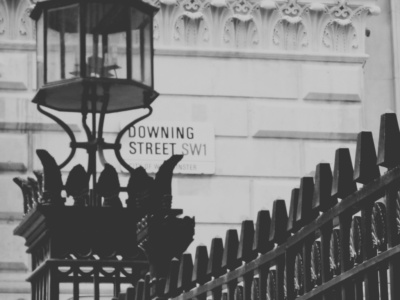UK house prices rose in October, up +1.1% on a monthly basis, breaking a run of six consecutive monthly falls.
The average house price is now £281,974 – an increase of almost £3,000 compared to the previous month.
On an annual basis, prices are down -3.2%, though the decline was at a slower pace than we saw in September (-4.5%).
Prospective sellers appear to be taking a cautious attitude, leading to a low supply of homes for sale.
This is likely to have strengthened prices in the short-term, rather than prices being driven by buyer demand, which remains weak overall.
While many people will have seen their income grow through wage rises, higher interest rates and wider affordability pressures continue to be challenges for buyers, said Kim Kinnaird, Director, Halifax Mortgages.
Across the medium-term, with financial markets not anticipating a decline in the Bank of England’s Base Rate soon, we expect house prices to fall further overall – with a return to growth from 2025.
Kinnaird continued, the current picture should continue to be seen in the context of the longer-term house price trend as, on average, prices remain around £40,000 above pre-pandemic levels.
First-time buyer market shows relative resilience
Despite weakness in overall buyer demand, the first-time buyer market has held up relatively well.
Buying a first home remains attractive for many, especially against the backdrop of rental prices increasing.
The latest house price data shows prices for first-time buyers are down -2.4% annually, a notably smaller fall than the market generally (-3.2%), over the past year.
Overall, however, the housing market remains subdued, with October marking the first rise in the cost of a typical UK home since March.
Nations and regions house prices
All UK nations and regions saw house prices decline on an annual basis.
The greatest fall was seen in South East England, where prices decreased by -6.0% over the last year (average house price now £374,066).
Scotland’s annual house price was the most resilient, down just -0.2% annually, with homes in the nation now costing an average of £202,608.
It was a similar picture in Northern Ireland, with a decline of -0.5%, and average house prices of £183,922.
Property prices in Wales fell by -3.9% over the year (average house price £213,125).
London continues to have the highest average house price in the UK, at £524,057, falling -4.6% over the last year.
| Average house price | Monthly change | Quarterly change | Annual change |
|---|---|---|---|
| £281,974 | +1.1% | -1.9% | -3.2% |
Housing activity
HMRC monthly property transaction data shows UK home sales decreased slightly in September 2023.
UK seasonally adjusted (SA) residential transactions in September 2023 totalled 85,610 – down by 0.6% from August’s figure of 86,150 (down 1.8% on a non-SA basis).
Quarterly SA transactions (July 2023 – September 2023) were approximately 3.0% higher than the preceding three months (April 2023 – June 2023).
Year-on-year SA transactions were 17.0% lower than September 2022 (19.3% lower on a non-SA basis). (Source: HMRC)
Latest Bank of England figures show the number of mortgages approved to finance house purchases decreased in September 2023, by 4.7% to 43,328.
Year-on-year the September figure was 32.5% below September 2022. (Source: Bank of England, seasonally-adjusted figures)
The RICS Residential Market Survey results for September 2023 continue to show a challenging market.
New buyer enquiries returned a net balance of -39%, up slightly from -46% in August, agreed sales -37% (up from – 46%) and new instructions -17% (up from -25%). (Source: Royal Institution of Chartered Surveyors (RICS) monthly report)
Tom Bill, head of UK residential research at Knight Frank, said:
“The financial pain of higher mortgage costs, the ambiguity over when and where interest rates will peak, and the uncertainty of an approaching general election and conflict in the Middle East mean that sentiment in the UK housing market has been unseasonably weak this autumn.
Thin trading means monthly price movements should be handled with care but price falls have been kept in check by the hesitancy of both buyers and sellers.
It means this slowdown has been a story of weak sales volumes, not fast-declining prices.
House prices will continue to come under pressure but we think they will bottom out in 2024.
We expect a decline of 7% this year and 4% next year as inflation comes under control and mortgage rates stabilise.”
Jeremy Leaf, north London estate agent and a former RICS residential chairman, comments:
“Halifax may be the country’s largest lender with historically reliable mortgage approval trends in its market survey but lack of inclusion of cash buyers, who make up about 30 per cent of the total, as well as borrowers from other lenders, means it tells only part of the story.
On the ground, we are seeing more business than the Halifax suggests with those not dependent on finance in particular negotiating hard with serious sellers as successive interest rate rises have taken their toll on borrowers.
However, we are not getting carried away with the modest rise in prices shown here.
Transactions remain subdued so looking forward we don’t expect to see much improvement in the market until January or February of next year as the earliest.”
Kate Steere, deputy editor and housing expert at personal finance comparison site finder.com gives her thoughts:
“There is still a shortage of supply when it comes to UK housing, and this is preventing house prices from spiralling downward for now.
However, I don’t believe this will last.
Although the base rate has been held by the BoE for the last two consecutive decisions, offering a bit more stability to the market, interest rates are still incredibly high and are expected to stay this way for the foreseeable future.
It’s likely that we haven’t yet seen the true impact of the Bank of England’s ‘higher for longer’ strategy on the UK property market.
Mortgage rates remain unaffordable for many households, and this will eventually lead to a reduction in demand which will create a downward pressure on house prices.”
Alex Lyle, director of Richmond estate agency Antony Roberts, comments:
“There is a good level of stock available but anything coming onto the market now needs to be priced at the right level as there isn’t the depth of demand in terms of enquiries compared with the start of the year.
Our business is all about confidence and two consecutive holds in interest rates are extremely welcome, helping buyers plan for the future.
Transactions are taking time and negotiations can be drawn out.
But there are opportunities for buyers who are brave enough not to sit on the fence with an autumn window where competition is more muted and vendors more realistic.”
Mark Harris, chief executive of mortgage broker SPF Private Clients, comments:
“While lenders are on the look out for potential headwinds which might impact mortgage pricing, on the whole they are much more confident than they have been in recent months.
There is much less volatility in the cost of funds with Swaps, which underpin the pricing of fixed-rate mortgages, continuing to edge downwards.
The second rate hold has increased speculation that base rate may have peaked, although even if this is the case, interest rates are unlikely to start declining for a while yet.
Lenders continue to reduce their fixed rates, with five-year money available from 4.62 per cent, compared with two-year fixes of just over 5 per cent.
Other lenders are enhancing and broadening criteria, which is a positive sign for the market and bodes well for coming months.”
Anna Clare Harper, CEO of sustainable investment adviser GreenResi, comments:
“Annually, house prices are down 3.2% to £281,974, so in nominal terms, we are back to approximately December 2022 prices.
The monthly house price rise is interesting, but not relevant because it’s unlikely that you can buy, sell or refinance at this pace.
Instead, transactions can easily take two to six months, making longer-term trends more relevant if you are considering doing anything with your home: buy, sell, rent or refinance.
Of course, we all are, because housing is a necessity, and we all have to live somewhere.
This is the same reason why fears of a full-scale crash are scaremongering.
Housing is a necessity, overall demand for places to live does not change as a result of the strength of the economy, and housing is so politically significant that no government will allow the market to crash.”
Tomer Aboody, director of property lender MT Finance, comments:
“Some resurgence in pricing in October reflects buyers either fed up of waiting or deciding that now is a good time to buy, with rates slightly lower than recent times.
With affordability still difficult, not many buyers are able to get on or move up the ladder, but the ones who can are faced with lower stock levels which in turn is maintaining price levels.
A government stamp duty intervention must surely come soon in order to give the market some much-needed stimulation.”
Mark Michaelides, VP Strategy & Corporate Initiatives at Molo, commented:
“While we’re not expecting interest rates to fall significantly any time soon given the stickiness of UK inflation, swap rates and fixed-rate deals have come down from their recent highs and we expect this to lead to a pick-up in demand for housing.”






















Comments